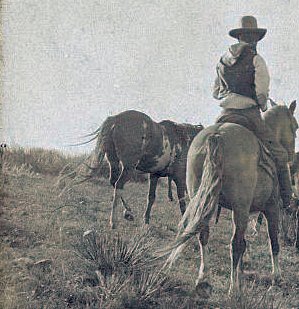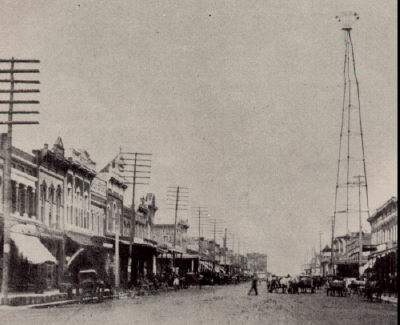|

STORIES MY FATHER NEVER TOLD ME
A Memorable Train Trip, or Lucy Ann Babb's "Pike's Peak" Farm
PART THREE: A WINTER JOURNEY
From Arthur Babb's Memoirs:
 I could not dispose of the crop in the field as I had hoped to, so it was December before I was ready to start my horseback ride from Mexia to Denison—168 miles by railroad, say 200 miles by country road. You could not ship stock in those days except by the car-load, and that was too expensive. So I had to ride and lead my horses this long distance. I could not dispose of the crop in the field as I had hoped to, so it was December before I was ready to start my horseback ride from Mexia to Denison—168 miles by railroad, say 200 miles by country road. You could not ship stock in those days except by the car-load, and that was too expensive. So I had to ride and lead my horses this long distance.
Now perhaps my reader is thinking that 200 miles is not far. No, to you it is not. You ride in a car over good roads. But this was in winter and the roads were often knee-deep in mud, and some days one did well to make 15 miles. And it was hard on the rider as well as the horse.
I remember that on this trip one night I had to ride late before finding a place to stay. It was raining and freezing. My slicker had frozen stiff on me. When I finally came to a place where they would take me in, a man had to help me off my horse—and it was some time before I could take a step.
Before starting I bought a new saddle and slicker. My horses, Lucy and Mollie, were in good condition. Lucy had been with me through many shifts and changes and many a hardship. Now she was to share my new home with me and have a pasture all her own-but of course she must share it with Mollie. There was a long muddy road ahead of us.
I think the first night out I stopped at Corsicana. It was there that I saw my first electric lights. A steel tower was erected near the center of the town with lights placed at the top forming a floodlight. It was after dark when I arrived. I could see the lights several miles before entering the town. After putting my horses up at a wagon yard, I went to inspect the light tower. I thought it a wonderful thing—and it was at the time. I believe Corsicana was the first electrically-lighted town in Texas, but am not sure. I was cautioned not to look directly at the light because it would injure my eyes. But I took a pretty good squint regardless.

Corsicana's electric light tower, erected 1886
Here we have another instance of Arthur's memory conflicting (slightly) with the facts of history. Although it is absolutely true that Corsicana had a tall light tower just as Arthur described, it was not in fact erected until late February 1886, about two months after Arthur's wintertime journey took him through the city. So how do we account for this anomoly? There are only two possible answers: Either Arthur made the journey in February or March 1886 instead of December 1885, or he saw the light tower on a later trip through Corsicana and with the passage of time conflated the two events in his mind. I think the latter is more likely.
It began raining the next day and when I arrived at Dallas several days later, the streets were muddy. There was no paving in those days. I crossed the river on the toll bridge at the foot of Commerce Street. The keeper stayed at the east end. I do not re-member what the fare was, but I paid and he withdrew a long pole and I passed through. I was bearing northward and came on to Elm Street somewhere and turned East. Ahead of me, I noticed a milk wagon drawn by four horses. At times it was all they could do to budge, and just before they got to the H. & T. C. tracks the axle was dragging in the mud. When the wagon stuck, the driver struck the wheel horses and out came the wagon tongue! The last time I saw him he was taking his milk-cans off the wagon and putting them on the wooden sidewalk. I got directions and turned north some place and struck the McKinney Road. It was about 4:30 P.M. A slow drizzling rain was falling and it was be-ginning to freeze. After getting out a few miles into the country I decided to begin looking for a place to put up for the night. Presently, I saw to my left a two-story brick residence, sitting some distance back from the road. It had a white picket fence in front. I rode up to the gate and called out. A young man came out and I asked if I could get lodging for the night. He replied, "I'll see Ma." He returned and told me to get down and come in. The hired man came for my horses and the young man showed me in. An old gentleman sat by the fire reading the paper. He spoke pleasantly and motioned me to a chair. That fire sure felt comfortable after a hard day's ride in a cold rain. I was hungry too, and smelled supper cooking. Another young man came in and sat by the fire. He seemed to be in ill health. Presently, when supper was announced, two young ladies came in. I learned they were the daughters of the old gentleman and sisters to the two young men. The table was well supplied and I was prepared to do justice to it. During the meal the lady of the house (Ma) made inquiries concerning myself, the purpose of my journey, etc. That night I shared a room with the hired man and took advantage of the opportunity to find out some-thing concerning my host. I had only to ask a question or two and my roommate gave all the information desired. I asked if the old gentleman that sat reading was the landlord. And what was his name? "Yes," the hired man replied, "That old man is Jack Cole. He's a surveyor. He laid out most of Dallas and does nearly all the surveying in this part of the country." I asked if the young men were his sons. "Yes they are his boys." he said, adding,"That one that sat by the fire, he's sick. They are going to send him out West. And the two big gals, they are his daughters, and you heard `em call the old lady Ma—well she rules the roost. What she says goes! Good ol' woman though."
The next morning, when I had finished breakfast and went in the living room, I asked one of the young men for my bill. He replied, "Ask Ma." I stepped back to the din-ing room and inquired of the good lady the charge for my keep. She said, "Nothing what-ever."
I thanked her for the gracious hospitality and bade them all goodbye. My horses were saddled and waiting at the hitch-rack in front. I mounted and looked back at the brick house in the oak grove. The cow lot and barn stood north of the house with some more oak trees about it—a home like place indeed. I rode away never expecting to see it again.
In the month of May 1926, a little more than 40 years later, my daughter Evalyn, was graduated from North Dallas High School. As I stood looking as she received her diploma, I said to my self, "We are now standing in the lot where the hired man cared for my horses so many years before." But where was my good host? Did the son get well? The home, the barn and lots were gone. Even the grand old oaks had been hewn down to give way to modern improvements. Then came to a verse from Omar Khyam:
How said it seems, this common thought. All things that are, must eer be nought."
After about a week more of hard riding I reached the end of my journey. There, I unsaddled Lucy and Mollie at the Pike's Peak farm that was to be our home for the next few years. I put them in the barn at the foot of the hill. Mother and the children were awaiting me and we were all comfortably installed in our new home.
|